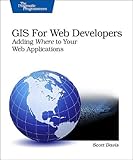Scott Davis
Author of "Groovy Recipes"

Scott Davis is the founder of ThirstyHead.com, a training company that specializes in Groovy and Grails training.
Scott published one of the first public websites implemented in Grails in 2006 and has been actively working with the technology ever since. Author of the book Groovy Recipes: Greasing the Wheels of Java and two ongoing IBM developerWorks article series (Mastering Grails and in 2009, Practically Groovy), Scott writes extensively about how Groovy and Grails are the future of Java development.
PRESENTATIONS
| Compile Time and Runtime Metaprogramming With Groovy |
| Grails + CouchDB |
| Tomorrow's Tech Today: HTML 5 |
BOOKS
Groovy Recipes: Greasing the Wheels of Java (Pragmatic Programmers)
Each recipe in Groovy Recipes begins with a concise code example for a quick start, followed by in-depth explanation in plain English. These recipes will get you to-to-speed in a Groovy environment quickly.
You'll see how to speed up nearly every aspect of the development process using Groovy. Groovy makes mundane file management tasks like copying and renaming files trivial. Reading and writing XML has never been easier with XmlParsers and XmlBuilders. Breathe new life into Arrays, Maps, and Lists with a number of convenience methods. But Groovy does more than just ease traditional Java development: it brings modern programming features to the Java platform like closures, duck-typing, and metaprogramming.
As an added bonus, this book also covers Grails. You'll be amazed at how quickly you can have a first-class web application up and running from ground zero. Grails includes everything you need in a single zip file⎯a web server (Jetty), a database (HSQLDB), Spring, Hibernate, even a Groovy version of Ant called GANT. We cover everything from getting a basic website in place to advanced features that take you beyond HTML into the world of Web Services: REST, JSON, Atom, Podcasting, and much much more.
GIS for Web Developers: Adding 'Where' to Your Web Applications
There is a hidden revolution going on: geography is moving from niche to the mainstream. News reports routinely include maps and satellite images. More and more pieces of equipment cell phones, cars, computers now contain Global Positioning System (GPS) receivers. Many of the major database vendors have made geographic data types standard in their flagship products.
GIS for Web Developers introduces Geographic Information Systems (GIS) in simple terms and demonstrates hands-on uses. With this book, you'll explore popular websites like maps.google.com, see the technologies they use, and learn how to create your own. Written with the usual Pragmatic Bookshelf humor and real-world experience, GIS for Web Developers makes geographic programming concepts accessible to the common developer.
This book will demystify GIS and show you how to make GIS work for you. You'll learn the buzzwords and explore ways to geographically-enable your own applications. GIS is not a fundamentally difficult domain, but there is a barrier to entry because of the industry jargon. This book will show you how to "walk the walk" and "talk the talk" of a geographer.
You'll learn how to find the vast amounts of free geographic data that's out there and how to bring it all together. Although this data is free, it's scattered across the web on a variety of different sites, in a variety of incompatible formats. You'll see how to convert it among several popular formats including plain text, ESRI Shapefiles, and Geography Markup Language (GML).
With this book in hand, you'll become a real geographic programmer using the Java programming language. You'll find plenty of working code examples in Java using some of the many GIS-oriented applications and APIs. You'll be able to:


